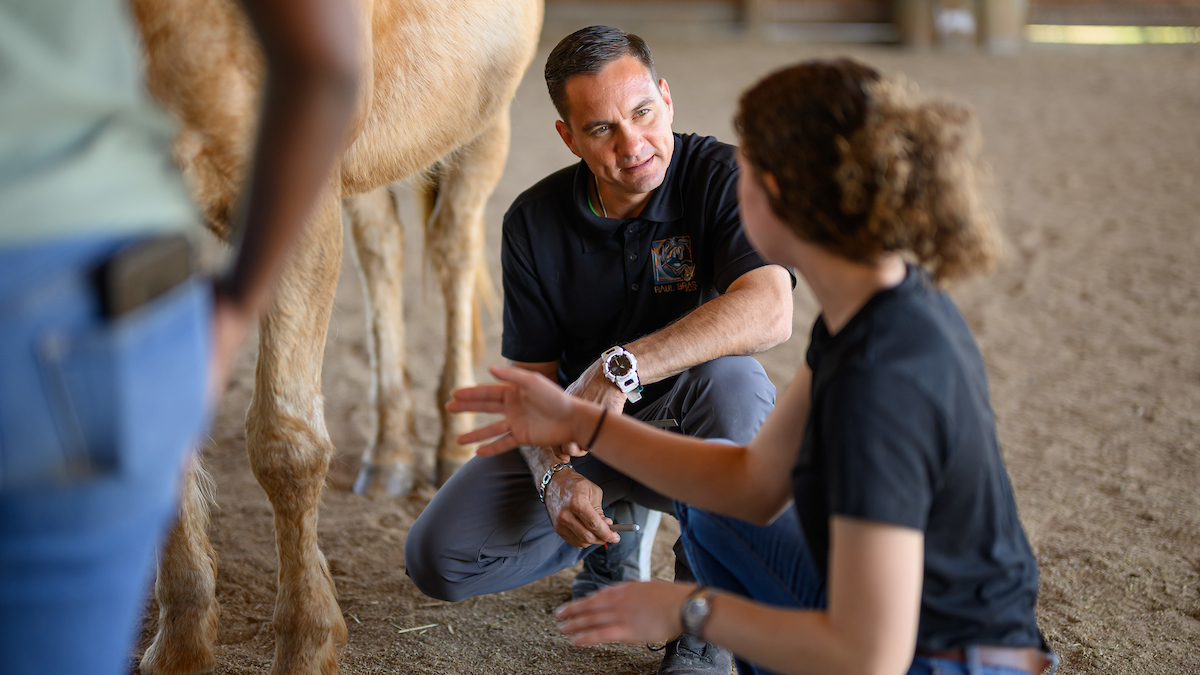Epilepsy Awareness: Discoveries at NC State Benefit Pets and People

November is National Epilepsy Awareness Month—for people and dogs.
More than two million Americans have the disease and one in 26 of us will develop epilepsy at some point in our lifetime. Each year some 780,000 dogs are diagnosed with epilepsy—which is the single most common canine neurological disorder—and more than 5% of all dogs will experience seizures in their lifetime.
Scientists in the NC State University Center for Comparative Medicine and Translational Research are investigating canine epilepsy—its causes, diagnosis, treatment, and management—and what they are learning is not only helping canine patients but is of interest to medical researchers studying the disease in people.
[section_subtitle] Researchers [/section_subtitle]
- Karen Muñana, professor of neurology and a board-certified neurology specialist with NC State’s Veterinary Hospital, works with hospital clients and their pets in exploring the causes of the disease and developing novel treatments through the Canine Epilepsy Outreach Program she manages.
- Christopher Mariani, an associate professor of neurology, evaluates potential biomarkers in canine cerebrospinal fluid to track cellular changes and improve diagnosis and therapy in dogs experiencing seizures.
- Natasha Olby, a professor of neurology, explores the cognitive changes that occur within dogs while on anti-seizure medication.
- Troy Ghashghaei, an associate professor of neurobiology, focuses his research on testing unconventional and novel treatment approaches for different types of seizures.
- Julie Nettifee Osborne, neurology research technician and epilepsy research and One Medicine associate, evaluates the program’s patient and client support and information efforts and helps increase public awareness of CCMTR epilepsy studies.
From bench research to clinical applications, diagnostics to treatments, CCMTR scientists are advancing our understanding of epilepsy. Significant work remains, however, to help owners of dogs with epilepsy deal with unpredictability of attacks, long-term outcome, and quality of life concerns.
[section_subtitle] Pets and Clinical Trials [/section_subtitle]
Pet owner and prior canine epilepsy study participant, Mary Grace McCoy, knows the struggles faced by pets and people with epilepsy.

“Major was my Australian Shepherd that was diagnosed with epilepsy at one year of age,” says McCoy. “I’ve worked in the medical field for 30 years and knew that we could help to make a difference by volunteering for veterinary clinical studies. I was one of the fortunate ones because, even though Major was euthanized this past spring due to age-related issues at 13, he achieved great seizure control during his lifetime thanks to the College of Veterinary Medicine.”
Major also provided many lessons to his family as well during this time period.
“A young boy at my son’s school had epilepsy,” McCoy explains. “Many of his classmates avoided him because of the misunderstanding associated with the disease. My son, however, connected strongly with this boy and they became good friends, thanks in part, to his experience with Major’s epilepsy and increased awareness of the disease.”
According to McCoy, Major was named after the Canis Major star constellation. She says he lived up to his name, becoming a star in his own right as he participated in Veterinary Hospital clinical trials and epilepsy public awareness campaigns.
The CCMTR epilepsy-related research is ongoing and early pilot studies underway in various labs include pharmacokinetic studies of novel anticonvulsants, evaluation of technologies to monitor and track seizures, explorations of the response of neurons at the time of seizures, and the role of allergens in epilepsy.
[section_subtitle] Research Support [/section_subtitle]
Individuals and organizations can support these pilot studies which may become the foundation of future productive investigations. In many cases, pilot project results provide the necessary data for researchers to apply for larger research grants.
Organizational supporters of NC State’s canine epilepsy research, education and outreach include Epil K-9, Toby’s Foundation, Five-Sibes, and Molly’s Seizure Study Fund. The founder of Molly’s Fund, Willard Moore, is a regular participant in various community canine and pet events where he staffs his own epilepsy awareness information booth.
Epilepsy is a One Medicine concern, meaning what a veterinary researcher discovers about the complex neurological disease can not only help the individual canine patient, but the dog breed, and perhaps people.
For background on epilepsy studies at NC State’s Center for Comparative Medicine and Translational Research or to become a partner and contribute to making a difference in CCMTR epilepsy research, contact Julie Nettifee Osborne at janettif@ncsu.edu


